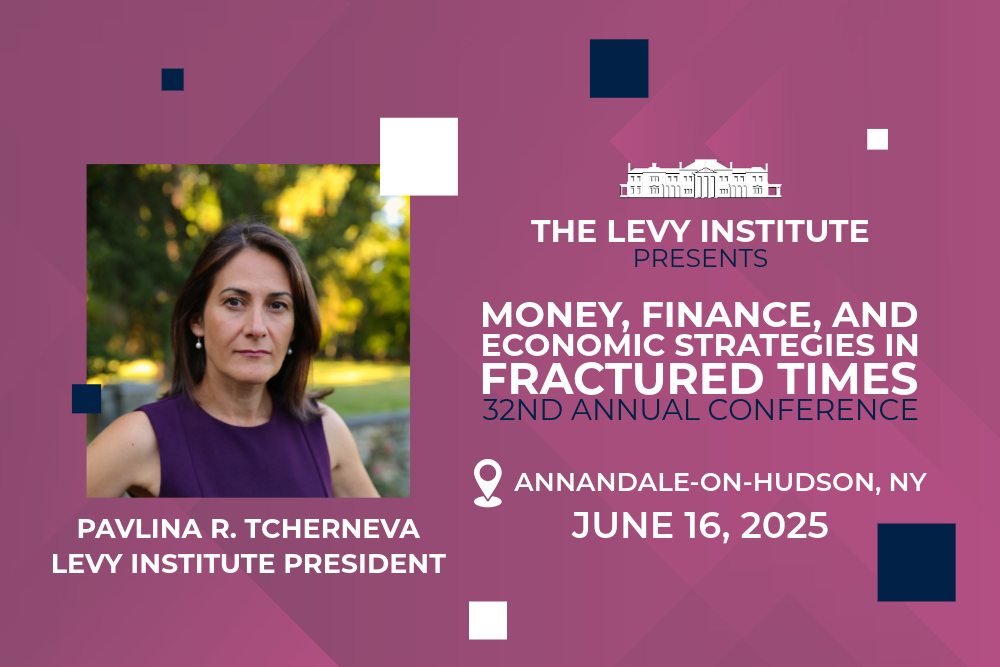Confronting Financial Fragility, Worker Crisis, and Global Turmoil
by Pavlina R. Tcherneva
On June 16, 2025, I will welcome colleagues and friends to the 32nd Annual Conference of the Levy Economics Institute—our first in-person gathering since the pandemic, convening at a moment of extraordinary economic upheaval. The challenges before us are among the most consequential in a century: a global trade order in disarray, deepening economic insecurity for working families, a financial sector growing more complex and opaque, and the urgent need for climate finance and new development paradigms.
We are navigating yet another phase of global economic turmoil—one that demands the bold, innovative thinking the Levy Institute has championed for decades.
The Levy Impact
Our research on financial instability became the definitive analysis during and after the Global Financial Crisis. More recently, our work on modern money and public finance reshaped debates around the necessary—and unprecedented—fiscal responses to the COVID crisis. Our job guarantee proposal has influenced global policy discussions, offering a viable alternative to means-tested welfare and punitive “workfare” systems.
Despite the post-COVID rebound, deep structural fissures in the American economy persist, fueling voter discontent and reshaping political landscapes. Against this backdrop, this year’s conference examines four critical themes:
- The evolution—and vulnerabilities—of the financial sector since the Global Financial Crisis, including climate finance and emergent risks through a Minskyan lens;
- The promise and limits of crisis response tools, assessing fiscal/monetary policy effectiveness and the resurgence of “pay-for” myths;
- The crisis of working America, linking economic grievances to political outcomes; and
- The global economic reordering, from trade realignments to alternative development models.
We are also honored to welcome Representative Ro Khanna (D-CA) as the Keynote Speaker this year, to address the challenges facing working families today.
Financial Instability and Threats to US Monetary Sovereignty
Since the GFC, markets have grown more opaque, more unwieldy, and more fragile—as the Silicon Valley Bank collapse and bond market turmoil earlier this year demonstrated. Meanwhile, the Trump administration’s policies are undermining confidence in dollar-denominated assets, fueling doubts about whether Washington remains willing—or even able—to orchestrate the kind of coordinated crisis response that only the United States can provide, and that global markets have come to depend on. Meanwhile, the deliberate dismantling of the administrative state—a Made-in-America self-inflicted crisis—has left the country dangerously unprepared. Hollowed-out agencies lack the capacity to enforce regulations, respond to economic shocks, or even reliably process citizens’ basic needs. This isn’t efficiency; it’s unilateral disarmament in the face of complex global challenges.
For the first time in decades, the payments system itself is under threat. A self-sabotage of dollar hegemony could crack the foundations of US monetary sovereignty—with global consequences.
Working Families: The Crisis No One Is Solving
Decades of neoliberalism have left working families—in the US and abroad—with eroding incomes, vanishing stability, and broken promises. This year, alongside our flagship research on financialization and public money, we confront the economic consequences of Trumpism, the bipartisan abandonment of the working class, and the political fallout.
At this pivotal moment, we ask: What is economic policy for? What do working families truly need? And how do we deliver the security they demand?
Trade Wars and False Solutions
Trump’s trade policies have shattered alliances and accelerated the death of the 1990s free trade model—and good riddance. This neoliberal vision, beloved by elites but few others, brought financialization and deindustrialization in equal measure. But tariffs alone won’t undo decades of neoliberal damage. Working families need good jobs, not the rising prices tariffs will bring. Meanwhile, as the Levy Institute’s stock-flow consistent research shows, the real harbingers of recession are the proposed cuts to discretionary spending, not tariffs per se.
Turning Chaos into Clarity
In The End of Laissez-Faire, Keynes once observed, “Many of the greatest economic evils of our time are the fruits of risk, uncertainty, and ignorance.”
At the Levy Institute, we believe economics must serve the public good and work in harmony with the natural systems that sustain life. Policy cannot be passive or supplementary—it must actively prevent and restrain the chaos of unfettered markets and the environmental and human costs it brings. Yet mainstream theories have too often been instrumental in generating the crises we must now solve. By prioritizing capital over people, austerity over wellbeing, and market dogma over democratic accountability, they have undermined economic security and stability.
This conference is an invitation to all participants and the larger community to cut through the chaos, confront broken orthodoxies, and advance policies that deliver a just, sustainable economy.
Welcome—let’s get to work.

